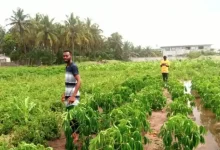CARE International-Ghana in collaboration with the International Livestock Research Institute (ILRS) and Cowtribe Technology has launched a new project in the Upper East Region dubbed, “Transforming the vaccine delivery system for chickens and goats in Northern Ghana.”
The new project which spans from March 2019 to March 2022, has among its aims, to improve vaccine delivery system for chicken and goats in northern Ghana particularly for smallholder farmers.
Funded by the International Development Research Centre (IDRC), the implementation of the vaccine delivery project would cover the Bawku West and the Pusiga District of the Upper East Region.
Speaking at the launching ceremony in Bolgatanga on Monday, the Assistant Country Director of CARE International-Ghana, Mrs Gladys Blekpe, explained that the three-year project sought to test and monitor two approaches, including gender accommodative and gender transformative, to improve vaccine systems for chicken and goats.
The Assistant Country Director stated that the project, apart from also seeking to create knowledge on institutional requirements for responsive vaccines delivery systems, would also seek to address women’s needs and gender norms towards an improved vaccine delivery system for animal health service providers and women farmers.
Mrs Blekpe said over the years CARE International-Ghana in implementing its projects, considered gender issues as very important, and mentioned that the new project was being implemented by a consortium comprising CARE International-Ghana, ILRS and Cowtribe Technology.
She entreated all the stakeholders in the poultry and the rearing industry, including the regional and district directors of the Department of Food and Agriculture, Council for Scientific and Industrial Research (CSIR)-Animal Research Institute, national and regional veterinary officers, paramount chiefs and the media, who attended the programme, to support the implementation of the project.
The Programme Manager of CARE International-Ghana in charge of Food and Nutrition Security who is also the Principal Investigator of the project, Ms Agnes Loriba, mentioned high gender disparity in accessing agricultural inputs, vaccine delivery system currently not centred on women’s needs, insufficient gender accommodative approaches to address inequality issues and the potential to increase women’s access to vaccines yet not maximised as among some of the challenges confronting smallholder women farmers.
She said apart from the project adopting gender accommodative measures and the gender transformative approaches to address the root causes of gender inequalities, it would also leverage on using the Cowtribe mobile technology to deliver animal healthcare in hard-to-reach areas.
She said that the project would also leverage on the Village Savings and Loans Associations (VSLAs) structures formed with the support of CARE International-Ghana on the project communities to work with women farmers as collectives to foster joint learning, reflection and action.
The launching ceremony was followed by a three-day inception and design meeting which paved the space for the stakeholders to deliberate extensively and sought partnership and collaboration on how to effectively implement the project.
FROM SAMUEL AKAPULE, BOLGATANGA







